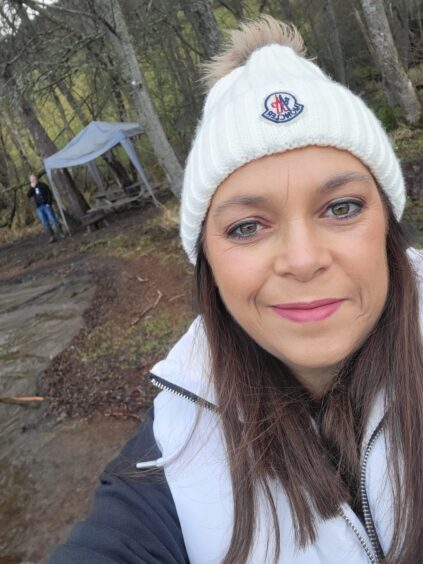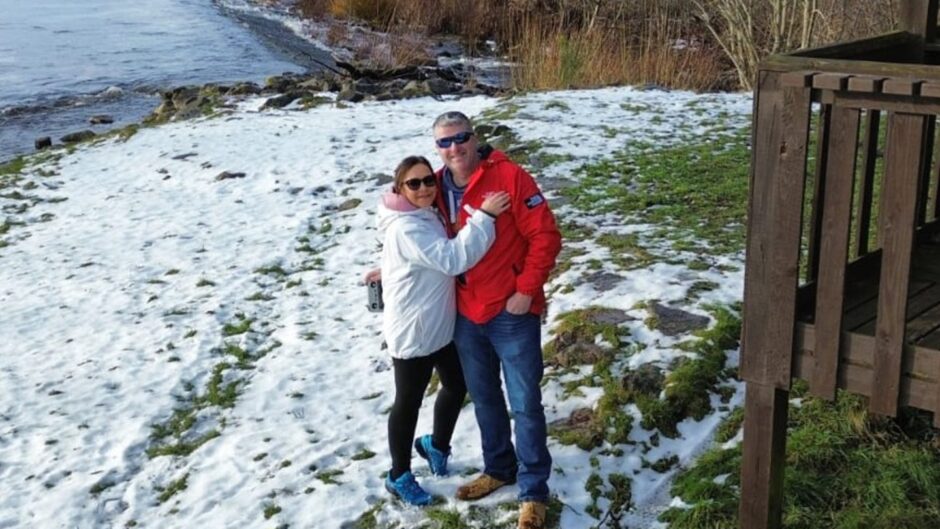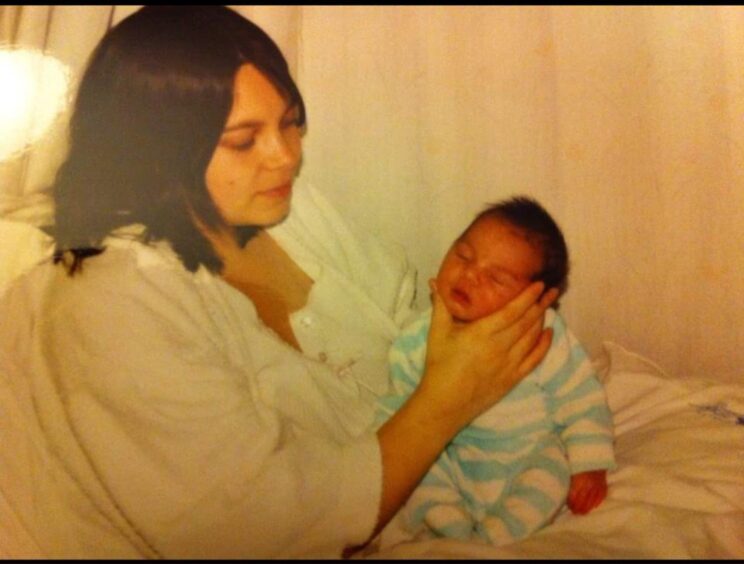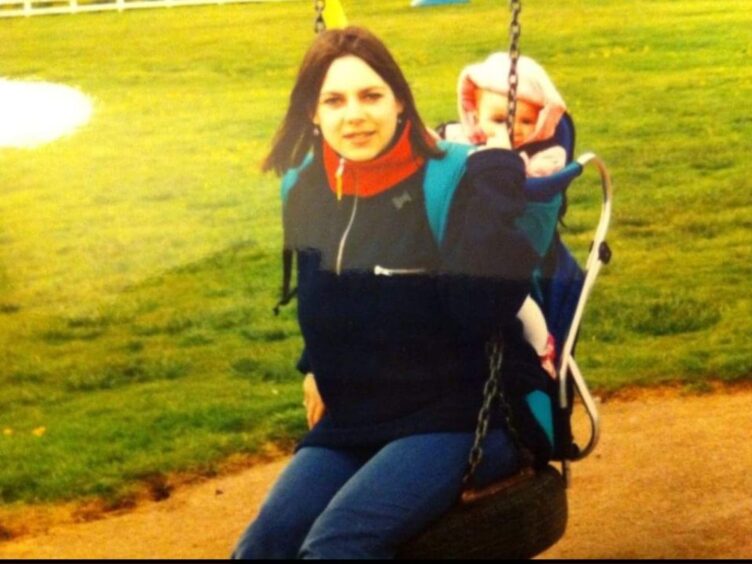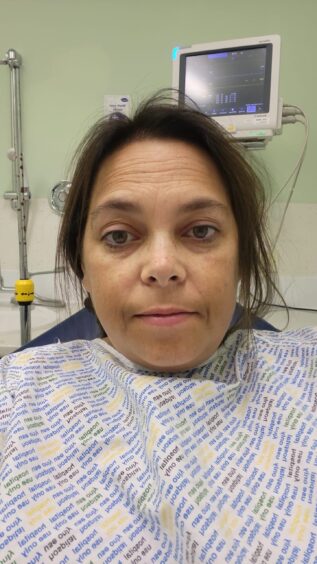Kath Campbell’s biggest wish is that in the future people with Crohn’s disease don’t have to go through what she has endured for more than 20 years.
The 49-year-old, who first started having stomach issues after the birth of her daughter in 1999, has been through six bowel surgeries.
She wears a stoma bag after surgery removed her large bowel.
Because Crohn’s remains untreatable, the disease is something Kath has learned to live with. But she steadfastly hopes it won’s always be that way.
So, to fund research into a cure for the disease that has overshadowed her life for the past two decades, the Drumnadrochit health visitor and former nurse is raising money this January.
“There’s people that are getting diagnosed every day,” says Kath. “But for Crohn’s, there is no cure at all. One day hopefully they will get a cure. That would be amazing.”
Kath takes on the Big Winter Workout for Crohn’s disease
Kath is undertaking 31 minutes of exercise each day for the full 31 days of January to raise money for Crohn’s & Colitis UK.
The challenge is part of the charity’s Big Winter Workout that encourages participants to get active during one of the year’s more miserable months.
So far, Kath has mainly logged her minutes by walking in the hills around Drumnadrochit.
And though she admits some might think half an hour is not a lot of exercise, she’s proud of what she’s achieved. After everything she has been though, getting out and about is a victory in itself.
“To me, it’s a lot for someone who’s not been out exercising or done anything like this before,” she says. “It’s a big commitment.”
‘I could have died’
Kath’s health problems started after problems during the birth of her daughter.
“I could have died,” says Kath, who had internal bleeding after a Caesarean section.
She believes she may have suffered post-traumatic stress from the experience, which can be a trigger for some bowel conditions.
“It was very stressful, and there wasn’t a lot of support afterwards,” she says. “It was like, we saved your life now on you go.”
She started getting diarrhea, and then some bleeding. Eventually she was diagnosed with ulcerative colitis, but none of the treatments worked and she suffered debilitating pain for the next 10 years.
“The stomach pains were every single day. They told me I would get flares and then it would ease off. But it never eased off for me.”
Determined to beat bowel condition by herself
The pain affected Kath’s life in many different ways.
“The way I managed it was just not to not to eat if I had things to do. It sounds crazy, but if I didn’t eat then I wouldn’t get the symptoms, and therefore it was easier to manage.”
Ulcerative colitis is curable, but the cure is to remove the large intestine. For years, Kath declined surgery partly, she says, because she didn’t want to spend her life with a stoma bag, the rubber-like pouch that is worn on the outside of the body and acts as an external stomach.
But she was also determined to beat her condition herself.
“I thought, I’ll try everything else before surgery. So, I tried acupuncture, a different diet, I went gluten free, dairy free everything. I just thought, I don’t want surgery. But in the end, it got to the point where I had no choice.”
Learning to live with a stoma — twice
She had the operation and an ileostomy — which forms the stoma — and soon learned to live with the external pouch.
More importantly, her pain was gone, and for 12 months all was well. She then had an internal pouch fitted, which meant she no longer had to deal with the stoma, and enjoyed another healthy 12 months.
But when she fell unwell again, doctors decided to remove the internal pouch and go back to a stoma.
“It was a bit of relief,” Kath says. “Things weren’t going that great anymore.”
A few years after that, however, Kath started getting obstructions in her stomach. She would eat food, it would get stuck and she’d have to go to hospital.
Doctors found that part of her bowel was stuck to her bladder so she had to undergo yet another operation to remove another section of the bowel, which was then sent off for tests.
Says Kath: “And that’s when they discovered it was actually Crohn’s I had rather than colitis.”
Disbelief, and turning her back on Crohn’s
Kath didn’t believe the doctors. All this time she thought she had been battling colitis, and the news she had Crohn’s was a shock.
“I didn’t believe it for years, and I know that sounds silly,” says Kath, who based her reasoning on the fact that the test results didn’t definitively point to Crohn’s.
She effectively turned her back on her diagnosis and for five years lived her life doing what she wanted, eating what she wanted.
But her health issues soon caught up — she started having obstructions again as well as problems eating.
She agreed to a course of biologic medication, a powerful treatment that stops inflammation and is injected into her every fortnight.
Walking to make Crohn’s more visible
Kath has been on the treatment for three months, and so far it is working.
“I would say things are much better than they have been over the past year,” she adds. “This past 12 months has been one of my worst for about 10 years and I would say I’m definitely beginning to feel much better.”
Her recovery played a role in her decision to do the Big Winter Workout challenge. Here was something she was able to tackle that would also help people like her.
She also saw it as an opportunity to make Crohn’s more visible.
“A lot of people, they don’t want to talk about it,” she says.
“I don’t care — I talk to anyone about it because I’ve had it for so long. But a lot of people pretend they don’t have symptoms, and just get on with their life. I think there is a lot of denial.”
The road to recovery lies through a snowy Drumnadrochit
Kath has already doubled her fundraising target of £125 and is hoping to add more before the end of the month.
She enjoys her daily walks, especially when the recent snow turned Drumnadrochit into a winter wonderland.
Sometimes she takes husband Mark with her, giving them both time to contemplate Kath’s two-decade journey with her bowel conditions.
“Every time I go out, I just think this is great,” says Kath, laughing. “Why don’t I do this all the time? I absolutely love it.”

